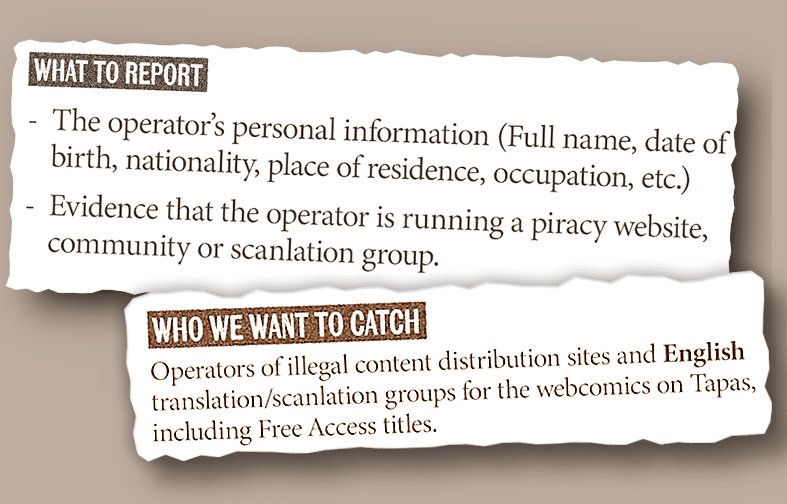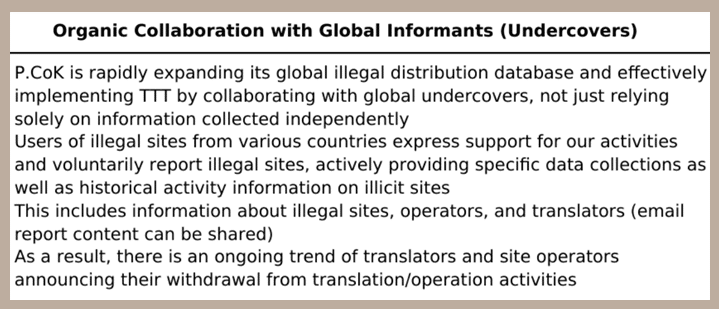If it was possible to strip away the roles and behaviors that inevitably lead to head-on clashes, in some cases pirates and piracy fighters might find ways to get along. In some cases they may love the same things.
Yet back in the real world, the insatiable appetite for pirated content owned or protected by the latter, means the war never ends, only the shape changes. Whether South Korean publishing company Kakao Entertainment had always intended to do something different isn’t clear, but when it comes to presentation, no equivalent approach to fighting piracy exists at scale anywhere else.
The Krew
Launched in 2021 to proactively protect Kakao Entertainment’s ‘webtoon’ comic library, the new ‘P.CoK’ anti-piracy unit’s name was inspired by the ‘eyes’ on a peacock’s feathers.
“We’re always on the lookout for illegal use of Kakao Entertainment’s exclusive content worldwide,” the Kakao ‘Krew’ explained in 2023.
P.CoK conceded that it couldn’t yet put a figure on the scale of the piracy it was addressing or the monetary value of any losses attributable to it. Of course, even the wider industry has to settle for best estimates, so a fairly blunt but honest admission was fundamentally credible, yet also quite rare.
At the time, forming a complete database of pirate sites responsible for sharing Kakao content remained a work in progress. On the prevention side, P.CoK reported working with watermarking, image recognition, and usage pattern analysis, which helped the team “keep an eye on things and nip illegal activity in the bud.”
Complete the Quest, Level Up
Like much of the corporate world, anti-piracy work and how it’s presented to the outside world may at times undergo a little cosmetic filtering, to send the right message or benefit from being seen in a particular light.
Due to the nature of the work there may be an element of misdirection, especially when the target audience are those the company and often the police are determined to catch.
In P.CoK’s case, some things that are so neat and perfect, you really, really want them to be true. Maybe they are.

Piracy Culture, Videogame Culture? No Problem
As presented, there are three people in the team, all quite young with great names – Xeno, Hani, and Jeno. These people undoubtedly understand Kakao’s audience, especially those who prefer not to pay—on sites where they’re also active members.
P.CoK also enjoys webtoons and without getting too personal, one spent a number of years as a webtoon artist. Then the icing on the cake – at least two are gamers. One likens shutting down a site to “clearing a stage” in a game and the other focuses on anti-piracy strategic planning and then “leveling up after completing a quest.”
Documenting Progress
The publication of an anti-piracy white paper every six months (Sixth Edition here) provides an overview of progress and challenges in Kakao’s fight against piracy.
As reported in February’s edition, a total of 240 million illegal content removals worldwide in the second half of 2024 contributed to a grand total of 740 million removals overall. This was made possible by Kakao’s Trusted Copyright Removal Program (TCRP) status at Google, and the small matter of filing 30,000 takedown requests every day.
Some rightsholders use their takedown notice volumes as a proxy for progress in the fight against piracy; at least in the beginning, the removal of a million links to pirated content tends to speak for itself. Yet when Kakao mentions a 10.9% decrease in takedown notices in its sixth White Paper, compared to the number cited in the fifth, the reduction represents progress instead.
The decline was largely attributed to P.CoK’s long-term monitoring and the subsequent shutdown of a “major domestic” pirate site. Kakao identifies the platform as site “A”, almost certainly a reference to Agitoon and the linked Agitoon Novel sites shut down in a law enforcement operation last August.

“The case underscores the critical role of site shutdowns in reducing overall piracy activity,” Kakao noted in February. “Kakao Entertainment has consistently emphasized that shutting down a site by identifying its operator is at the core of its response to illegal distribution.”
Rare outlier examples aside, when a site operator’s anonymity is compromised, that can forever change the game. Anti-piracy outfits tend to keep unmasking details secret for operational reasons. P.CoK likes to tell those stories on social media.
Raising Awareness, Recruiting Informants
 The theory that raising awareness of piracy discourages illegal consumption, is being tested in several ongoing campaigns. Spreading the message that piracy hurts everyone involved in creating webtoons, is one of P.CoK’s responsibilities.
The theory that raising awareness of piracy discourages illegal consumption, is being tested in several ongoing campaigns. Spreading the message that piracy hurts everyone involved in creating webtoons, is one of P.CoK’s responsibilities.
The day-to-day platform of choice for raising awareness is Twitter. At what point spreading the gospel of Kindness to Creators began its transformation isn’t clear, but today the P.CoK account on X is much more than that.
Acting as a notice board for P.CoK’s anti-piracy activities and the availability of legal content, the channel also encourages webtoon fans to report links to illegal content, wherever they exist online.
For fans and supporters prepared to go further, P.CoK’s channel on X acts as a recruitment office for informants. After obtaining useful information from piracy circles, they head back to base where the information is relayed to P.CoK for enforcement purposes.

Having gathered a number of willing informants over the last couple of years, P.CoK claims to have built an underground network that actively supports its One Point Response System.
Shutting Sites Down Using Any Legal Means
Traditional wisdom suggests that revealing details of an anti-piracy enforcement plan up front may introduce unnecessary risk. Yet having shared the details of its One Point Response System with TorrentFreak recently, at face value P.CoK probably thinks otherwise.

P.CoK’s response to infringement begins with TTT: Targeting, Tracing, and Takedown. It’s at this early stage that the technical aspects, operations, revenue streams, and
community details of pirate sites are gathered together, and cross-referenced with P.CoK’s databases of illegal site operators and the networks they operate in.
After combining and analyzing all available information, a shortlist of suspected site operators is compared with a list of actual operators. After final verification, the next stage can begin.

P.CoK says that it reaches out to the operators of pirate sites and services via “legally effective communications” such as email or physical documents. From the information available to us, the strategy seems to rely on operators believing there’s a credible threat of escalation, but they hold none of the cards.
Anonymity Gone – Choose a Poison
With the clear emphasis being placed on removing all anonymity, proving that to be the case will likely support efforts to convince operators that anything other than total capitulation is already a lost cause. Those who push back could face civil or criminal action.
Those who decide to comply and throw in the towel are expected to post a public announcement, shut down their site, and pledge never to infringe again. These final ‘goodbye’ statements are also posted on X, where the consequences of non-compliance are on display, presumably for the benefit of others in a similar position. It’s the modern-day equivalent of a severed head on a pike, with a comfortable chair and maybe a beer as a tempting potential off-ramp.

Of course, there are no restrictions on who can read these types of notices, which range from members of the public curious about content being made available for free, to lower tier pirate site staff and uploaders nervous about maintaining anonymity.
Even those daydreaming about launching a site of their own one day might stumble upon one of the statements below and take a different course.

Anti-piracy outfits aren’t typically known for seeking this type of attention. That being said, we assume P.CoK only has to take Kakao’s interests into account and having agreed the parameters, it simply gets on with the job. We’re informed that the total number of sites shut down has risen to 28 following the sudden closure of Reaper Scans announced this week.
A ‘goodbye’ message posted by the operators of Reaper Scans revealed that the demise of the 10 million visits per month site was triggered by a cease-and-desist notice received via email. It transpires that P.CoK had identified three Reaper Scans operators in as many countries (United States, India and Croatia) and for good measure, addressed them personally using their real names.
Why Reveal the Plan and Who Benefits?
While the plan is quite detailed, specific, and at times, fairly elaborate, it contains no information useful to pirate site operators. Equally, there’s no sign of anything that undermines P.CoK or Kakao or the strategy itself. That naturally leads to the obvious question: who benefits from the details being made public?
Assuming that this is a true representation of P.CoK’s plan, it’s fundamentally solid; identify the suspects, leave no space for maneuver, provide an exit strategy, and work hard in advance to ensure that despite the presence of choice, site operators have only one viable option.
Indeed, by being unambiguous about how things are likely to play out, at all times there’s a tacit understanding over where this will inevitably end up for the freshly deanonymized. The joker in the pack concerns the informants; how many actually exist, or do any exist at all? Are they effective? Who are they?
To the extent that answers to any of those questions are in any way helpful, pirate site communities have been known to self corrode from excessive suspicion alone.

From: TF, for the latest news on copyright battles, piracy and more.
Source : P.CoK Webtoon Piracy Fighters Display Plumage as Unorthodox Tactics Pay Off









